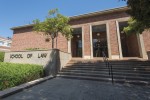When Elizabeth Arias delivered an oral argument before the nation’s largest federal appeals court in June, she remembered spending countless hours practicing and preparing for the case.
“I was really nervous,” Arias said. “It’s a big deal so I wanted to do well to represent my professor and the school.”
Arias, who graduated from the UCLA School of Law this year, presented before the court as part of the law school’s First Amendment Clinic. The clinic is a course led by professor Eugene Volokh that allows law students to work on cases dealing with First Amendment issues.
Legal clinics under the UCLA law school provide a hands-on legal experience for law students and allow them to work on real cases.
Through the First Amendment Clinic, Arias was able to work on French v. Jones, a case that dealt with speech allowed in elections.
Along with two other law students, Arias extensively researched and wrote drafts in support of Mark French, who ran for justice of the peace in Montana in 2014 but was prohibited from showcasing his endorsements from the Republican Party.
“Montana has a law that says elected state judges are not permitted to accept or use endorsements from a political party,” said Arias. “So Mr. French was running for office and sued the state of Montana for violating his First Amendment right.”
French lost the case in the District Court and appealed at the U.S. Court of Appeals for the 9th Circuit where Arias delivered her argument. While she did not directly represent French, the court will take her argument into consideration when deciding on the outcome of the case.
“My oral argument skills and writing has grown leaps and bounds from the willingness of professor Volokh to share his advice,” Arias said. “The judges were hard on me with their questions – which is to be expected – but it was ultimately a great experience.”
This past year, other UCLA law students have also been able to get involved in high-level cases.
The Supreme Court Clinic, created and led by professor Stuart Banner, allows students to work on pending U.S. Supreme Court cases.
[Related: UCLA law professor, students win Supreme Court case through clinic program]
In the clinic, students learn valuable skills useful in court while helping people who cannot afford a lawyer, Banner said.
“Having a case for the Supreme Court takes lots of time and effort which most people can’t afford to pay lawyers to do,” Banner added.
The Supreme Court receives thousands of cases a year but only hears about 60 or 70. However, the Supreme Court heard two of the clinic’s cases this year and ruled in their favor, Banner said.
Last month, the clinic was behind the victory of a free speech case called Matal v. Tam.
The case was about a band, The Slants, that was not allowed to trademark its name because the U.S. Patent and Trademark Office claimed it was disparaging to Asian-Americans, said Ryan Azad, a former UCLA law student who worked on the case and who worked for the Daily Bruin as an undergraduate.
Founder Simon Tam named the band The Slants to reclaim the word from its use as a racial slur against Asian-Americans, Azad added. Tam sued the U.S. Patent and Trademark Office to have the federal law preventing disparaging trademarks declared a violation of freedom of speech under the First Amendment.
Banner and his students researched and wrote the briefs the Supreme Court justices read that presented arguments in support of Tam. On June 19, the justices sided with Tam by a vote of 8-0.
Azad said his writing greatly improved from this experience.
“Professor Banner is an extremely talented and prolific writer and spends an inordinate amount of time reading our drafts and providing us with detailed comments,” Azad said. “That is not something that many law students – let alone full-grown lawyers – get in their careers, so it was a special treat to be a part of the clinic.”
Terra Laughton, a former student of the Supreme Court Clinic, said she thinks the clinic is special because the outcomes of the Supreme Court cases that the students work on affect laws upheld throughout the country.
“Very few cases are heard by the Supreme Court and, as a result, very few lawyers get to work on Supreme Court cases,” Azad said. “The fact that, as law students, we get to work on so many is really an invaluable opportunity.”
Whitney Brown, another student who participated in the clinic, said she thinks clinics like the First Amendment Clinic and Supreme Court Clinic teach students how to highlight their clients’ strengths while managing aspects of the case that might undermine the client’s position.
“These are invaluable skills that can be difficult to learn in the classroom, but are essential to a lawyer’s task,” Brown said.
